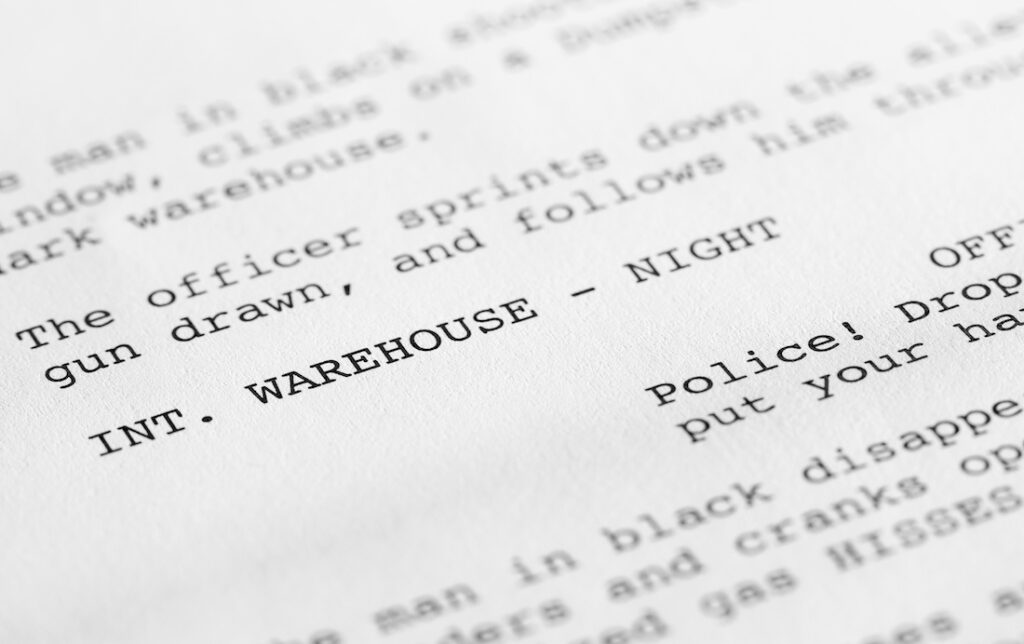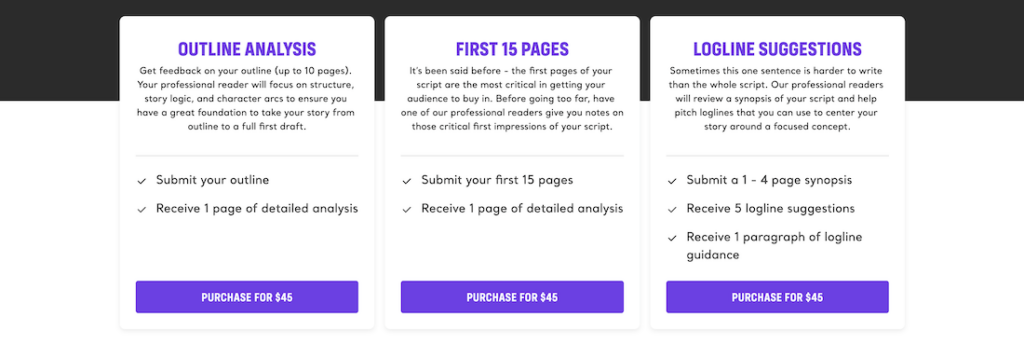Budding screenwriters can learn the art, craft and business of screenwriting in many ways. The celebrated professionals with Oscars and box office hits have come from many walks of life when it comes to how they got their screenwriting education.
Some attended film school (George Lucas, Francis Ford Coppola). Others created their own film school by watching and studying movies (Quentin Tarantino).
Whether you get your knowledge from film school, studying movie catalogs, reading screenwriting books, taking online courses or diving into screenwriting software to conjure scenes, there’s a wealth of knowledge from many different places. And even the most successful professionals will tell you that screenwriting education never ends. You’re always adapting and evolving as a screenwriter.
With that in mind, here we peel back the layers of screenwriting education by ranking the top five ways to learn how to write screenplays. We’ll delve into the strengths and weaknesses of each, starting from what we feel is the overall least effective to the most effective of the five.
Top Five Screenwriting Education Options Ranked
5. Film School
We’re not knocking education here. If you can attend a university — film school or not — we highly recommend it. When it comes to film school, it’s ranked the least effective because it depends on where you go.
According to The Hollywood Reporter, the top five film schools are:
- American Film Institute
- New York University — Tisch School of Arts
- University of Southern California — Los Angeles (USC)
- Chapman University
- Cal Arts
Read More: A Complete Guide to the Best Film Schools in the U.S.
But not everybody can afford to go to film school — or make the move to different cities and states to attend. The benefit of going to one of the best is that you’re usually learning from seasoned professionals. Most other film schools — or media programs — are limited in screenwriting mentors with industry experience. While instructors from those schools may have knowledge to share, you can learn a lot more from other resources.
And there is no screenwriting bachelor’s degree. Film schools will focus more on the filmmaking aspects of the industry, with screenwriting as one of the classes required for a film school degree or degree in media.
The true benefit of film school is attending the options with the most connections with the Film/TV industry (AFI, USC, CAL ARTS, UCLA). You can utilize those mentor and peer connections you make to expand your industry network post-graduation.
Read More: Should Screenwriters Go to Film School?
4. Online Courses and Mentorship Programs
Just a notch above film school lies a much more affordable option — online courses and mentorship programs. These types of online options are usually offered by individuals who have had some industry experience, be it as professional screenwriters, former Hollywood executives, or former industry script readers and story analysts.
You’re getting pretty much the same advice and instruction you would be receiving from lower-tier film school or media programs, but for a fraction of the price.
The benefits are that you’ll be guided through the basic industry guidelines and expectations regarding story development, screenplay format, structure, characterization, dialogue, and marketing. These basics are all that you need to begin your screenwriting journey.
With mentorship programs, you’ll also benefit from having one-on-one access to mentors who can help guide you through the learning process.
We rank online courses and mentorship programs above film school for easier access when it comes to the financial and geographical hurdles of attending film school. Again, the benefits outweigh the easier access and more affordable online options if you can attend the top programs with the most industry connections. But if you can’t, you can get the same — if not better — screenwriting education than lower-tier film school or media programs.
3. Screenwriting Books
Screenwriting books can be an excellent way for screenwriters to search for industry knowledge, wisdom, perspective, philosophy, experience, tips, and instruction.
- You can learn the basics from format to structure in books like The Screenwriter’s Bible.
- You can dive deeper into story analysis with Robert McKee’s Story.
- You can apply or learn from theoretical formulas like those found in Save the Cat!
- You can seek wisdom from mythological structure in Chris Vogler’s The Writer’s Journey.
- You can gain behind-the-scenes knowledge from successful blockbuster screenwriters in Writing Movies for Profit.
There are so many screenwriting books packed with knowledge, experience and instruction. For some professional screenwriters, the best film school experience was reading screenwriting books in the Barnes and Noble Film/TV aisle.
Yes, you need to pick and choose wisely. But you always get a wide variety of options that you can cherry-pick from as you develop your own style and philosophy.
Screenwriting books are obviously more affordable and available to screenwriters compared to film school, online classes, and mentorship programs. And the best ones are usually written by industry professionals with a background in screenwriting, studio development, and studio coverage.
Read More: The Best Screenwriting Books for Screenwriters
2. Becoming a Script Reader
Beyond learning the basics of format, structure, story, and characterization, there’s no better screenwriting education — beyond actually doing it (see below) — than becoming a script reader.
A script reader is someone who is tasked with reading and evaluating screenplay submissions. In short, they offer script notes.
- Interns and assistants for production companies, agencies, and management companies.
- Professional script readers and story analysts for studios, networks, and streamers.
- Screenplay contest, competition, and fellowships readers and judges.
As a script reader, you’ll be asked to read multiple submissions and write script coverage that ascertains whether or not a script should advance to the next competition round or higher-tier development decision-makers.
Why is this position the best overall screenwriting education? Because you’re reading examples of the best screenwriting out there, as well as the worst.
- 95% of the scripts that script readers read are horrible — or just not ready. You will quickly start to see the red flags and glaring mistakes made by scripts like these.
- 4% of the scripts read by readers are average. As a screenwriter, you can use this knowledge to understand the difference between an average script and one that is good enough to get purchased and produced.
- 1% (usually less than) of the script being read are fantastic, for any number of reasons. They are few and far between, but when you find them, you’ll truly see what kind of script goes the distance.
The educational aspect of being a script reader is one of the greatest hidden treasures in the industry. Reading multiple scripts each week — the amazing, the average and the bad — will help you master screenwriting format, structure, dialogue, prose, theory, genre dynamics, etc. You’ll be many steps ahead of the pack.
Read More: How to Become a Hollywood Script Reader
1. Learn By Writing Scripts
Notice how we didn’t use the singular. You don’t learn screenwriting by writing a single script. In fact, your first script is always your worst. You learn by writing multiple scripts and learning from both your triumphs and failures.
Most successful screenwriters write multiple scripts before they write the marque script that got them representation, a sale, an assignment, or a produced project. And you need to have a stack of amazing screenplays to truly draw decision-makers’ attention, primarily because the first thing you’re asked after that first general meeting is, “What else do you have?”
Reading and evaluating the screenplays of others is truly the best screenwriting education you can receive — before (or while) you start writing multiple scripts of your own.
- When you get feedback from mentors and peers, you’ll learn how to take feedback and notes.
- As you later begin to submit to contests, competitions, and fellowships to test the waters, you’ll hopefully opt to pay extra for the script coverage they offer. And then learn from the notes they give and your eventual placements.
- When you market and query production companies, managers, and development executives and get them to read your scripts, you can gauge what scripts are making an impact and what scripts aren’t.
- As you begin to network and submit your scripts to various contacts you’ve made, you’ll hopefully get feedback and be able to gauge responses.
But none of this happens until you’ve written multiple screenplays. You learn most by writing, failing, writing again, improving, failing, writing again, etc.
- Don’t take six months to a year or more to write a screenplay.
- Try to write under professional deadlines (2-3 months) to allow more time to move on to other scripts.
- Learn how to move on to the next script as quickly as possible while also writing excellent material in the process.
You’ll learn the most from your triumphs and your failures. Ultimately, that is the best screenwriting education you’ll ever receive. And know that professionals making a living are still learning with every single screenplay they write.
Ken Miyamoto has worked in the film industry for nearly two decades, most notably as a studio liaison for Sony Studios and then as a script reader and story analyst for Sony Pictures.
He has many studio meetings under his belt as a produced screenwriter, meeting with the likes of Sony, Dreamworks, Universal, Disney, and Warner Brothers, as well as many production and management companies. He has had a previous development deal with Lionsgate, as well as multiple writing assignments, including the produced miniseries BLACKOUT, starring Anne Heche, Sean Patrick Flanery, Billy Zane, James Brolin, Haylie Duff, Brian Bloom, Eric La Salle, and Bruce Boxleitner, the feature thriller HUNTER’S CREED, and many produced Lifetime thrillers. Follow Ken on Twitter @KenMovies and Instagram @KenMovies76.
CHECK OUT OUR PREPARATION NOTES SO YOU START YOUR STORY OFF ON THE RIGHT TRACK!
The post What is the Best Screenwriting Education? appeared first on ScreenCraft.
Go to Source
Author: Ken Miyamoto







